News
“The criminal justice system in South Asia is discriminatory and violent”: Ambika Satkunanathan
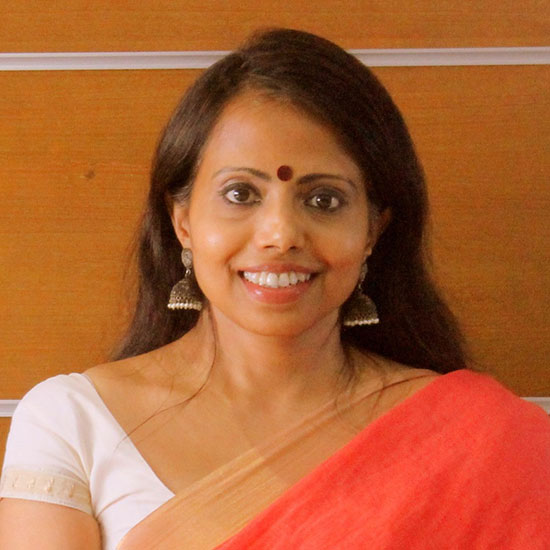
As a lawyer and human-rights champion who led the first-ever national study of prisons in Sri Lanka last year, Ambika Satkunanathan is vocal against the violence that is an endemic part of prison systems, and the ‘retributive’ and ‘vengeful’ nature of state justice that creates worse problems in society and creates criminals rather than rehabilitating them.
“Violence is used to maintain order, which robs the person in prison of dignity and agency from the moment they enter prison until they leave. Violence and discrimination are normalised in the system,” says Ambika, who was commissioner of the Human Rights Commission of Sri Lanka from 2015 to 2020.
“This penchant for violent forms of punishment is a result of societies being wedded to the punitive and carceral approach to dealing with what are essentially social problems,” she adds. “We believe that locking someone up and throwing away the key solves the issue, but it only compounds it.”
Regardless, she says, societies in the Subcontinent continue with this deeply flawed approach because it is easier than addressing the root causes of what is defined as ‘crime’.
The question of what constitutes crime has become increasingly blurred in the recent past in South Asia as more and more human-rights activists and even journalists in the region are being targeted by their own governments, and imprisoned on the basis of draconian colonial-era laws, and kept confined as ‘undertrials’ for years until the case begins. In these instances, prisons are being used not to deter crime but to deter dissent, and to threaten those who speak up against governments, even ‘democratic’ ones.
She shares her observation that South Asian societies are more skewed towards punishing individuals over corporations, and the underprivileged over the privileged. “A large multinational corporation will be able to use technicalities and the immense resources at their disposal to escape accountability for environmental degradation, while someone with a few grams of marijuana will be imprisoned. Therefore, your social position, power and privilege impact how you are treated by the criminal justice system, which is not neutral or objective but is discriminatory and violent,” asserts Ambika, who did her BA and LLB from Monash University in Australia, and LLM from the University of Nottingham.
Women even more vulnerable. “In Sri Lanka, women suffer structural violence in many ways. For instance, they don’t have access to even sanitary napkins, have no access to reproductive health care, and there is inadequate access to pre and postnatal care,” she says, describing a scenario that could apply to a number of rural areas anywhere in the Subcontinent.
Apart from facilities and infrastructure, women also bear the brunt of carrying the ‘honour’ of the family, or loss of reputation, which is more severe for them than for men. “When women are imprisoned, they often lose the support of families or partners / husbands and hence find it difficult to retain legal representation. It prolongs their imprisonment,” says Ambika, who has been a Chevening scholar and currently serves as the chairperson of the Neelan Tiruchelvam Trust, the only indigenous grant-maker in Sri Lanka, combining human-rights and peacebuilding initiatives.
Further, she says, women are more stigmatised and find it challenging to rebuild their lives following release from prison. This in turn pushes them into exploitative situations that leads to them being imprisoned again. “The vicious cycle continues,” she explains.
Women are also vulnerable to the gendered aspect of violence to which they might be subjected – another staple in South Asian societies. For women activists from minority communities in Sri Lanka, the challenges are progressively worse.
“If you are a Tamil woman activist working in the Northern Province, you will face additional challenges, such as surveillance, constant visits by the security agencies to your house to make inquiries about your activities, and phone calls prior to events or demonstrations to intimidate you from participating,” she shares.
Ambika’s own journey from a lawyer to a human-rights champion has been shaped by her identity as a Tamil woman in Sri Lanka – particularly the discrimination she faced. The violence and fear of violence that Tamils have experienced in Sri Lanka cast a shadow that hung over her life as long as she can remember.
“This is what drove me to study law and work to further the protection of human rights. The personal became the political because the political impacted every aspect of my personal life, like that of most Tamils in Sri Lanka,” she says.
She looks back with pride at her work at the Human Rights Commission of Sri Lanka where, despite structural and systemic impediments, she managed to strengthen connections between the Commission and civil society and survivors of human-rights violations. “It helped create an environment of trust whereby they felt they could approach the Commission for remedies,” she says.
At a webinar organised by South Asia Peace Action Network last month on the topic ‘Rights of the incarcerated in South Asia’, Ambika stressed on the importance of civil society organisations in South Asia coming together to share experiences, especially strategies, used to counter similar challenges.
“Other South Asian countries have seen authoritarian regimes similar to the current one in Sri Lanka, and are aware of or have experienced state efforts to stifle dissent and intimidate and harass human-rights activists. Similarly, patriarchy, misogyny, and sexism are not particularly unique to Sri Lanka. Since the problems are similar, so are the solutions. We must learn from each other rather than reinventing the wheel,” she says.
Ambika believes the solution lies with civil society who can help activists who are imprisoned or targeted by the powerful. “The most important way is to openly voice solidarity with the activists. Other means include mounting legal challenges to these state acts as well as engaging in advocacy, both nationally and internationally,” she says.
Providing support to the families of the activists, whether material or otherwise, is often understated, but goes a long way too, she adds. “Often the psychological aspect of incarceration is ignored. Therefore, offering moral support to the families is imperative,” she says, suggesting that supporters can visit imprisoned activists, taking them books or food to show they are not forgotten. “It reminds them that there are people who continue to fight for their release.”
While envisioning a unified and socially just South Asia, Ambika believes there’s a lot more that needs change than just laws. “Before we speak of laws, let’s speak of values. In South Asia, majoritarian and ethno-nationalist politics have taken hold and discrimination against minorities is common,” she says.
Giving examples of how religious minorities face constant threat – the Tamils and Muslims in Sri Lanka; Muslims and Dalits in India; and Sikhs, Shias and Christians in Pakistan – she believes South Asian countries are moving further away from secularism “if not in law, then certainly in deed.”
She has a special bone to pick with the death penalty. Citing both the legal and historical point of view, she refers to the South Asian cultural perspective that leans heavily towards the Hindu and Buddhist principles of the supremacy of all forms of life: “Abolish, abolish, abolish the death penalty! The death penalty is a cruel and inhumane punishment which, as research has shown over and over again, does not in any way prevent crime but instead causes great harm,” she asserts.
As a society, Ambika says, we need to introspect how much we all are responsible in perpetuating crime: “When we address the root causes of social problems, address the deep inequalities within society, we will not have to expend energy formulating humane punishments.” (Money Control)
News
Activists demand implementation of Easter Commission recommendations
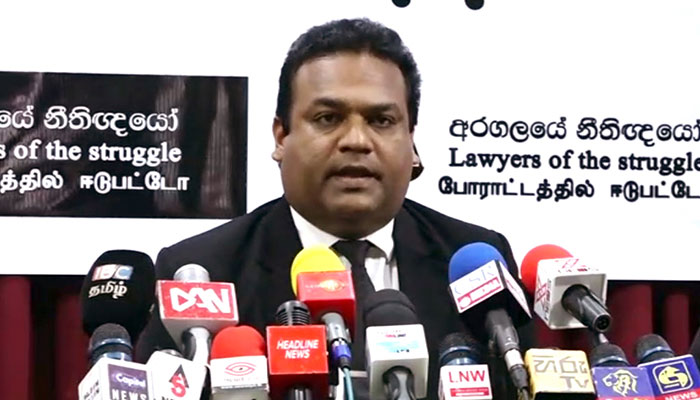
Religious and civil society leaders have called on President Anura Kumara Dissanayake to begin implementing the recommendations outlined in the Special Presidential Commission that investigated the Easter Sunday terror attacks without further delay.
Addressing a press conference held at the Centre for Society and Religion in Colombo, Lawyer Manoj Nanayakkara stated that 71 months have passed since the Easter Sunday attacks, yet justice has not been served for the victims.
“We are approaching the sixth anniversary of this heinous crime, which claimed nearly 300 lives and wounded twice as many others. President Anura Kumara Dissanayake had promised to conduct a fresh investigation into this crime. In the meantime, he could implement the recommendations of the Special Presidential Commission that probed the Easter Sunday terror attacks. This would demonstrate that the current government is keeping its word to deliver justice to the victims,” Nanayakkara said.
He also commented on Ven. Galagodatte Gnanasara Thero, who has been holding press conferences, claiming to have information related to the terror attacks and to know the masterminds behind them. “Our question is why he does not go to the law enforcement agencies and share the information he claims to possess. There is no purpose in making such statements at press conferences. As a citizen, his duty is to share this information with the investigating authorities.
Therefore, we believe that Gnanasara Thero is engaging in a political ploy at the behest of someone else. He should be aware that intentionally withholding information about a brutal massacre and failing to share it with the investigating authorities is an offence punishable under the Penal Code,” Nanayakkara said.Rev. Fr. Julian Patrick Perera, Rector of St. Joseph Vaz Deva Dharma Niketanaya, also addressed the press conference.
By Norman Palihawadana
News
Modi three-day visit formally announced
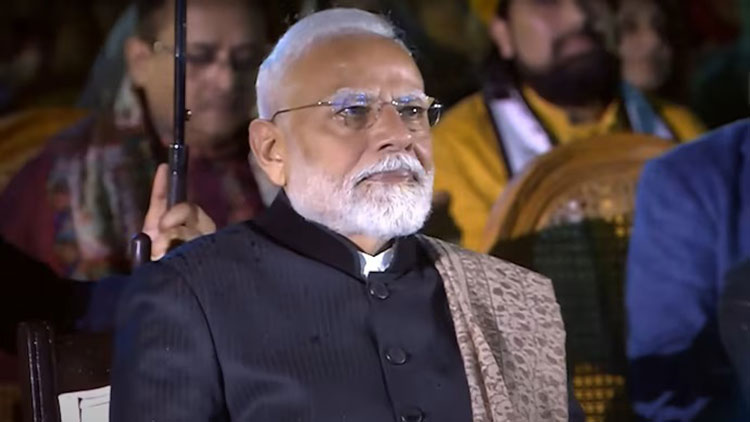
The Colombo foreign ministry Friday formally announced Indian Prime Minister Narendra Modi’s visit to Sri Lanka when he will have bilateral talks with President Anura Kumara Disanayaka and Prime Minister Dr. Harini Amarasuriya.
While in Sri Lanka,Modi is scheduled to visit Anuradhapura to pay homage to the sacred Sri Maha Bodhi and will inaugurate several projects implemented in Sri Lanka with the assistance of the Government of India, a ministry release.
A number of Memoranda of Understanding inked between the two countries are also expected to be exchanged during this visit, it added.
The Indian PM will be accompanied by the Minister of External Affairs, the National Security Advisor, Foreign Secretary and other senior officials of the Government of India.
News
COPE investigates drug supplies and preferred favourite supplier
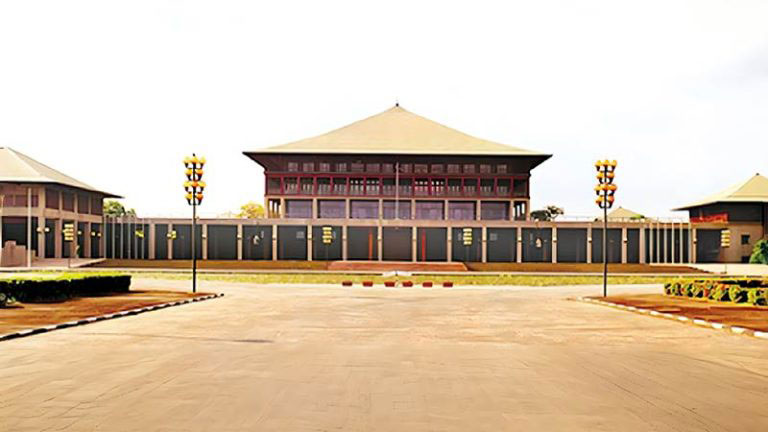
It was revealed in the Committee on Public Enterprises (COPE) that a private company named ‘Savorite’ was issued Waiver of Registration (WoR) certificates to import 38 types of medicines in 2022 without the evaluation of the National Medicines Regulatory Authority (NMRA).
The former Secretary to the Ministry of Health also informed the Committee that the former Minister of Health had given instructions to select this private company to import medicines in this way, parliament sources said on Friday.
This was disclosed when the COPE met in Parliament recently under the chairmanship of MP Dr Nishantha Samaraweera, to examine the Auditor General’s reports for the years 2022, 2023 and 2024 and the current performance of the NMRA.
The Committee Chair informed the committee that on December 30, 2022, the NMRA had issued Waiver of Registration (WoR) certificates to a private company named ‘Savorite’ for the import of 38 types of medicines submitted through unsolicited proposals without the evaluation of the NMRA.
The Committee Chair said that the NMRA has abdicated its responsibility, stating that the purpose of establishing the NMRA is to ensure the quality, safety and efficacy of those medicines and that it cannot be handed over to the Medical Supplies Sector.
Former members of the Board of Directors of the NMRA said that since the import of medicines through a special pathway with prior approval was carried out, the Board of Directors could not grant permission for it without conducting a proper evaluation. Therefore, they said that they did not accept responsibility in this regard.
Accordingly, this matter was discussed at length in the committee, and it was revealed that the former Minister of Health had instructed to select a private company called ‘Savorite’ to import the medicines in short supply for three months.
Meanwhile, the Committee also discussed at length the Cabinet Memorandum submitted by the former Minister of Health on September 26,2022. The Committee Chair inquired from the Ministry of Health officials about the fact that a large number of medicines would reach zero levels within the next three weeks from the date of submission of the relevant Cabinet Memorandum.
The officials who responded said that the information had been added to the Cabinet Memorandum based on the information obtained from the existing database regarding medicines. However, the committee Chair said that it was unacceptable for a large number of medicines to reach zero levels at the same time and that the relevant responsible officials had acted irresponsibly until such a level was reached.
The Auditor General, who spoke at the time, stated that the medicines that were ordered and to be received in advance have also been imported, citing that the medicines have reached zero levels.
Accordingly, the committee chair instructed the officials to submit a full report to the Committee on who were the officials involved in preparing this Cabinet Memorandum. The Chair further stated that a full report regarding the import of these medicines will be prepared by the Committee and submitted to Parliament, and that necessary action will be taken expeditiously.
MPs Mano Ganeshan, Nalin Bandara Jayamaha, S. M. Marikkar, Chaminda Wijesiri, Attorney-at-Law Nilanthi Kottahachchi, Chandima Hettiarachchi, Asitha Niroshana Egoda Vithana, Kosala Nuwan Jayaweera, Sudath Balagalla, Dr S. Sri Bavanandarajah, Lt Com (Retd.) Prageeth Madhuranga and Samanmali Gunasinghe were present in this committee meeting.
-
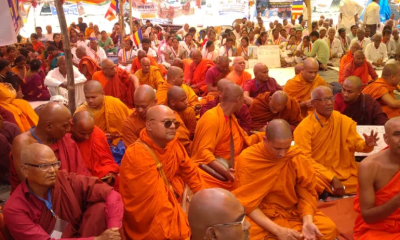
 Foreign News6 days ago
Foreign News6 days agoBuddhism’s holiest site erupts in protests over Hindu ‘control’ of shrine
-

 Features5 days ago
Features5 days agoCelebrating 25 Years of Excellence: The Silver Jubilee of SLIIT – PART I
-

 Editorial7 days ago
Editorial7 days agoWhen tractors become cars!
-

 Business3 days ago
Business3 days agoAIA Higher Education Scholarships Programme celebrating 30-year journey
-

 Business5 days ago
Business5 days agoCEB calls for proposals to develop two 50MW wind farm facilities in Mullikulam
-

 Features5 days ago
Features5 days agoNotes from AKD’s Textbook
-

 News2 days ago
News2 days agoGnanasara Thera urged to reveal masterminds behind Easter Sunday terror attacks
-
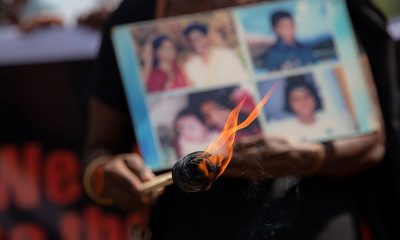
 Features7 days ago
Features7 days agoPolitics of Enforced Disappearances in Sri Lanka











